In ancient China, men and women were not as free as they are now, where they could send gifts to whoever, whenever they wanted to express their feelings.
Marriages were typically arranged, and couples often only saw each other after the wedding.
Encountering someone they loved was uncommon, and marrying that person was even more so.
In ancient times, expressing romantic feelings was less straightforward than it is today. People rarely dared to openly and boldly declare their love.
Instead, they often conveyed their emotions by “symbolically attaching their hearts” to objects, which they would present as tokens of love to their beloved.
Sachets, also referred to as spice bags or flower sacs, are made by wrapping Chinese herbal medicines with silk thread.
In the pre-Qin period, young people would see their parents and elders wearing woven sachets to show respect, and so they in turn began to gift these to each other as a sign of affection that can be worn.
In “Dream of the Red Chamber”, Daiyu gives Baoyu a sachet, and later thinks that he gave it away to someone else (when in reality he was already keeping it close to him), and in her anger destroys another one that she is making.
This illustrates the profound emotional importance that even seemingly trivial things held for people in that era.
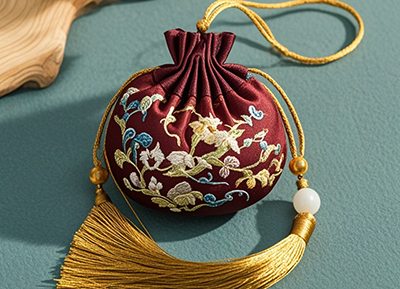
赠送 (zèng sòng): v. to give as a gift
mǎi shǒu jī zèng sòng huà fèi.
买 手 机 赠 送 话 费。
Get phone bill credit when you buy a cell phone.
The concept of rings symbolizing commitment is not just a Western tradition, and has actually also been a custom in our country for a long time.
As far back as the Southern Dynasty (420-589 BCE) Liu Jingshu “Yiyuan” records an exchange of rings between a recently married couple, and in the late Tang Dynasty, the tradition changed to rings being given only by men to women.
Because rings were seen as token of commitment, unmarried women in ancient times did not wear them casually.
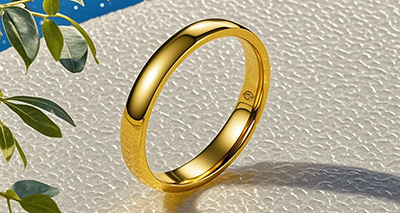
戒指(jiè zhi): n. ring
qǐng shōu xià zhè gè jiè zhi zuò wéi xìn wù.
请 收 下 这 个 戒 指 作 为 信 物。
Please accept this ring as a token.
Hairpins, also known as head scratchers, were commonly used to express love by ancient women.
In fact, there are numerous stories about women removing their hairpins to emphasize the importance of what they were saying, or burning their hairpins to show their resolve in letting someone they loved go.
While hairpins might be said to have served a practical function as they do today, in ancient times they were much more significant and went beyond simple “accessorizing”.
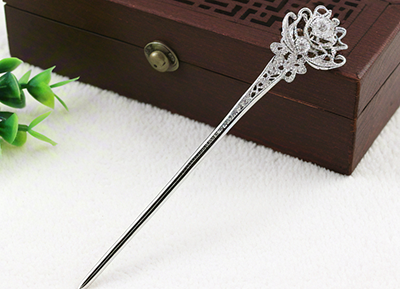
首饰 (shǒu shì): n. jewelry
tā pèi dài de shǒu shì áng guì jí le .
她 佩 戴 的 首 饰 昂 贵 极了。
The jewelry she’s wearing is extremely expensive.
Bracelets were called by many names in ancient times, and often appeared literary works as gifts presented among deities.
The bracelets signified commitments to each other, and recognition of each other as being worthy of remembering.
Nowadays, jade bracelets are quite significant possessions to own in China.
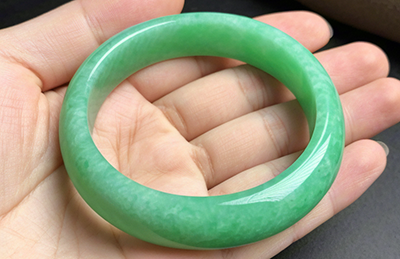
手镯(shǒu zhuó): n. bracelet
tā bǎ zhè gè shǒu zhuó zuò wéi lǐ wù sòng gěi wǒ.
他 把 这 个 手 镯 作 为 礼 物 送 给 我。
He gave me this bracelet as a gift.
“The beauty of jade is like the virtue of a gentleman.” Jade was a symbol of the gentleman in ancient China.
Someone who exemplified the gentleman paid attention to respect and peace, as well as gentle and distant love.
Therefore, the elegant and calm gentlemen of ancient times liked to use jade as a symbol of love, thus appearing restrained and polite, neither eager nor alienated.
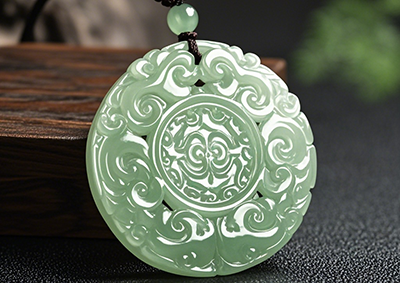
象征 (xiàng zhēng): n. symbol, token; emblem & v. to symbolize; to signify
āi jí jīn zì tǎ shì gǔ āi jí de xiàng zhēng.
埃及金字塔 是 古埃及的 象 征。
The Egyptian pyramids are a symbol of ancient Egypt.
Just as combs set hair in order, so did they symbolize a couple growing old together.
Giving someone a comb meant that you wanted to grow old with that person, to be “entangled” for a lifetime.
As a kind of tool that does more than just stay with the person, a comb was an intimate gift, one closely tied to the idea of feminine beauty in ancient China, as the ideal hair was seen as being both straight and smooth.
In some ways, the focus on hair gave it an outsized importance to men in ancient times.
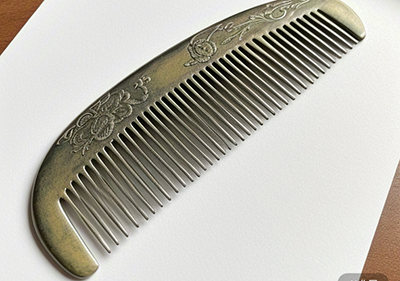
梳子(shū zi ): n. comb
tā de tóu fà ràng shū zi guà zhù le .
她 的 头 发 让 梳 子 挂 住 了。
The comb got caught in her hair.
“Two Wonderfully Mythical Places from Chinese Folklore”
“Three Classic Mid-Autumn Festival Legends You Must Know”
”Three Chinese Dances Go Viral”

Chinese Culture
HSK Test
General Chinese (Beginner Level)
General Chinese (Intermediate Level)




